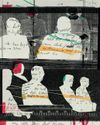
Asecret appointment exists between past generations and our own," Walter Benjamin wrote. "Our arrival on earth was expected." At pivotal moments, the philosopher argued, voices from the past reach out to us with prophetic force, escaping oblivion as a result. The past is not a fixed, eternal image; it is shaped by present concerns.
A few years back, Will Crutchfield, the artistic director of the Teatro Nuovo opera company, happened upon the name of Carolina Uccelli, a Florentine composer, singer, and poet who lived from 1810 to 1858. Her opera "Anna di Resburgo" had its premiere in Naples, in 1835, and then dropped from sight. The idea that a woman had gained a foothold in the otherwise all-male world of Italian operatic composition intrigued Crutchfield, and he got hold of the score. Convinced that it merited a second chance, he brought it to Teatro Nuovo. A pair of performances last month, at Montclair State University and at Jazz at Lincoln Center, proved him emphatically right. "Anna' is a formidable achievement for a composer in her mid-twenties. It feels like the slightly overstuffed but hugely promising early work of a major voice. The fact that Uccelli never completed another opera shows the extent to which musical history is influenced by forces that have little to do with innate talent.
This story is from the August 12, 2024 edition of The New Yorker.
Start your 7-day Magzter GOLD free trial to access thousands of curated premium stories, and 9,000+ magazines and newspapers.
Already a subscriber ? Sign In
This story is from the August 12, 2024 edition of The New Yorker.
Start your 7-day Magzter GOLD free trial to access thousands of curated premium stories, and 9,000+ magazines and newspapers.
Already a subscriber? Sign In

GET IT TOGETHER
In the beginning was the mob, and the mob was bad. In Gibbon’s 1776 “Decline and Fall of the Roman Empire,” the Roman mob makes regular appearances, usually at the instigation of a demagogue, loudly demanding to be placated with free food and entertainment (“bread and circuses”), and, though they don’t get to rule, they sometimes get to choose who will.

GAINING CONTROL
The frenemies who fought to bring contraception to this country.

REBELS WITH A CAUSE
In the new FX/Hulu series “Say Nothing,” life as an armed revolutionary during the Troubles has—at least at first—an air of glamour.

AGAINST THE CURRENT
\"Give Me Carmelita Tropicana!,\" at Soho Rep, and \"Gatz,\" at the Public.

METAMORPHOSIS
The director Marielle Heller explores the feral side of child rearing.

THE BIG SPIN
A district attorney's office investigates how its prosecutors picked death-penalty juries.

THIS ELECTION JUST PROVES WHAT I ALREADY BELIEVED
I hate to say I told you so, but here we are. Kamala Harris’s loss will go down in history as a catastrophe that could have easily been avoided if more people had thought whatever I happen to think.

HOLD YOUR TONGUE
Can the world's most populous country protect its languages?

A LONG WAY HOME
Ordinarily, I hate staying at someone's house, but when Hugh and I visited his friend Mary in Maine we had no other choice.

YULE RULES
“Christmas Eve in Miller’s Point.”